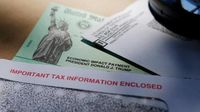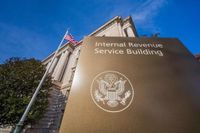Time is running out for over a million Americans who may still be eligible for a $1,400 stimulus check through the Recovery Rebate Credit, with the deadline to file their 2021 tax returns approaching fast. According to the Internal Revenue Service (IRS), approximately one million taxpayers have yet to file their returns for 2021, which is necessary to claim this credit. The IRS has emphasized that this final COVID-era stimulus payment is available for those who did not receive one or more of the three Economic Impact Payments (EIPs) distributed during the pandemic.
As of now, the IRS has completed most automatic payments for those who qualified but hadn’t claimed the credit, with those payments being sent out by January 2025. However, if you didn’t file at all in 2021, you likely missed that automatic payment, making the upcoming filing deadline crucial. The deadline to submit your 2021 federal tax return is April 15, 2025. If you file by this date and qualify, you could receive up to $1,400 in direct payment.
The IRS has made it clear that income is not a determining factor for eligibility. “Even if your income from a job, business or other source was minimal or non-existent, you should still file,” the agency stated in a recent release. This means that even those with little or no income in 2021 may still qualify for the credit.
Many people may have assumed they would automatically receive all stimulus checks, but various issues—like missing paperwork or changes in filing status—may have left them without the funds. Others might not have realized they were eligible for the Recovery Rebate Credit, especially if they don’t typically file taxes. Thus, the IRS is urging individuals who think they might qualify not to delay. Filing the necessary paperwork might seem daunting, but it could potentially bring $1,400 into your pocket.
To claim the Recovery Rebate Credit, taxpayers should visit IRS.gov and navigate to the section specifically addressing this credit. They need to download and complete their 2021 tax return and ensure it is filed by the April 15 deadline. This is a hard cutoff, and after this date, the opportunity to claim this specific credit will close permanently.
As part of the IRS’s efforts to ensure that eligible individuals receive their payments, the agency announced in December 2024 that it would automatically issue payments to those who had not claimed the Recovery Rebate Credit on their 2021 tax returns. Payments can reach a maximum of $1,400 per person, with the IRS estimating total payments to amount to approximately $2.4 billion.
Individuals who qualify but failed to claim the Recovery Rebate Credit on their 2021 tax returns were expected to receive payments by late January 2025. The IRS will send these payments either to the bank account listed on the taxpayer’s 2023 tax return or by mail to the address on record. For those whose bank accounts have been closed since filing their 2023 tax return, the payment will be returned to the IRS, and the refund will be reissued to the taxpayer’s listed address.
It’s essential to note that the deadline of April 15, 2025, is also Tax Day for 2024 returns, which makes it doubly important for individuals to file their 2021 tax returns. This date marks the three-year deadline to claim any tax refunds or credits for the 2021 tax year, including the Recovery Rebate Credit.
For those who filed their 2021 taxes but did not claim the Recovery Rebate Credit, it’s still possible to qualify for the payment. Taxpayers should ensure they have all necessary documentation, such as W-2 forms and other income statements, to file accurately. The full $1,400 is available for individuals whose adjusted gross income (AGI) was no more than $75,000 in 2021. For married couples, the AGI limit is $150,000.
Kevin Thompson, a finance expert and CEO of 9i Capital Group, highlighted the significance of the Recovery Rebate Credit, noting, "The most important thing about the Recovery Rebate Credit is that it's refundable—meaning you can get the credit even if you don't owe taxes." This is a crucial distinction, as many may not realize that refundable credits can exceed what they owe and result in a cash refund.
Alex Beene, a financial literacy instructor at the University of Tennessee at Martin, pointed out that while many Americans received stimulus checks during the pandemic, there remains a small group of taxpayers who qualified but never received their payments. He stated, "While it's inconceivable to millions of Americans who received stimulus checks during the pandemic, there are still a small group of taxpayers who qualified for payments who never received them."
For those who believe they may qualify for the Recovery Rebate Credit, the IRS advises them to act quickly. Taxpayers should file their 2021 returns by April 15 to secure the funds before they are sent back to the Treasury. Other tax refunds and credits may also be available for individuals who did not file taxes for 2021, making this an opportune time to check eligibility.
In summary, the IRS is urging all eligible individuals to file their 2021 tax returns before the April 15, 2025 deadline to claim the Recovery Rebate Credit. This credit represents a valuable opportunity to receive financial assistance that many may have missed during the pandemic. As the deadline approaches, it’s crucial for taxpayers to take action and ensure they don’t leave $1,400 behind.








